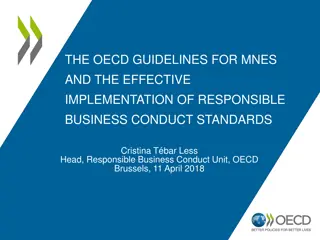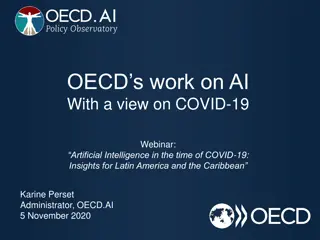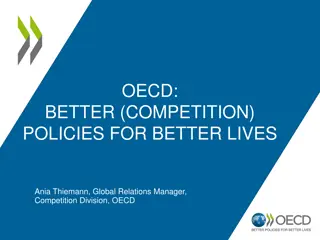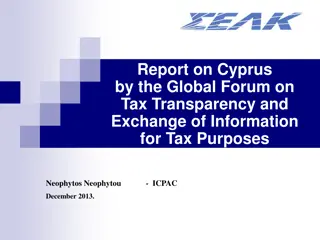Improving Regulation through OECD Accession Process
In-depth overview of the OECD accession process, highlighting the rigorous review and impact on candidate countries. It covers steps involved, committees engaged, and recent accession cases, showcasing the catalyst role in reforming legislation, policies, and practices.
Download Presentation

Please find below an Image/Link to download the presentation.
The content on the website is provided AS IS for your information and personal use only. It may not be sold, licensed, or shared on other websites without obtaining consent from the author.If you encounter any issues during the download, it is possible that the publisher has removed the file from their server.
You are allowed to download the files provided on this website for personal or commercial use, subject to the condition that they are used lawfully. All files are the property of their respective owners.
The content on the website is provided AS IS for your information and personal use only. It may not be sold, licensed, or shared on other websites without obtaining consent from the author.
E N D
Presentation Transcript
Learning Outcomes At the end of this chapter you should be able to: Explain the meaning and purpose of accounting; Describe the role of accounting as an information system; Describe how ethics and governance relate to accounting; and Assess the impact of external environmental factors on accounting.
Lesson Outline What is accounting The accounting process Accounting as an information system Accounting as the language of business The users of accounting External environmental factors influencing accounting Accounting as a profession Role of ethics and governance in Accounting
Definitions on Accounting What accounting does. Accounting is the art of recording, classifying and summarizing in a significant manner and in terms of money, transactions and events which are, in part at least, of a financial character, and interpreting the results thereof. (AICPA,1941). Purpose and functions of accounting. Accounting is the process of identifying, measuring and communicating economic information to permit informed judgments and decisions by users of the information. (AAA,1961).
Definitions on Accounting (Contd.) Define information. with reference to the concept of Accounting is a service activity. Its function is to provide quantitative information, primarily financial in nature, about economic activities that is intended to be useful in making economic decisions. (AICPA, 1970). The term quantitative information is wider in scope than financial or economic information of previous definitions.
Definitions on Accounting (Contd.) In general, accounting can be defined as a process of identifying, measuring, communicating information to facilitate decision making of users of information. recording and Responsibility of the management of an entity to prepare and present financial statements to meet the information needs of users.
Accounting Process The identification of transactions and events (economic events of an organization) First Stage Expression of these transactions and events in a common denominator- usually in money Second Stage Recording, classifying and summarizing transactions and events in the accounting records Third Stage Presenting of the information generated through the processing of transactions and events in the financial reports. Fourth stage
Accounting Information System Transactions and Events (Input) Financial and other reports (Output) Accounting Process
Accounting as the language of business Symbols Rules Numerals and words, debits and credits General set of procedures followed in creating financial information of an entity Unique to the accounting discipline
Activity 1.1 A business entity applies to a bank to obtain a loan to purchase a motor vehicle. Identify the items of information that a loan officer of the bank would consider in deciding whether to approve the loan.
Users of Accounting Information Management Accounting Financial Accounting Internal Users External Users Parties that make decisions directly affecting its internal operations. Parties other than management that make decisions concerning their relationship to the organization. The Diverse groups Management
Activity 1.2 State the differences between financial accounting and management accounting in terms of users of reports, types of reports, frequency of reports and content and format of reports.
External Environmental Factors influencing Accounting Political environment Economic environment Social environment Technological environment Legal environment
Activity 1.3 Identify the environmental factors that would influence a software development company.
Accounting Profession: Different Roles Public Accounting (Accountant in public practice) Business Accounting (Accountant in business) Offer their professional services to the public for a fee Employed in business entities e.g. Financial accounting, Management accounting Development of accounting information systems e.g. Auditing and assurance services Taxation services Advisory services
Activity 1.3 Identify the fields or career paths in Accounting
What is ethics? How we act in order to make the right choice and produce good behavior.
The ethics and its importance Principles of professional conduct Integrity Objectivity Professional Competence and Due care Confidentiality Professional Behavior International Ethics Standards Board of International Federation of Accountants (2013)
What is Corporate Governance? The term corporate governance is usually defined as the system by which companies are directed and controlled (Cadbury Report, 1992).
Corporate Governance Transparency & Accountability Controlling & Directing the Directors Role of shareholders and stake holders























